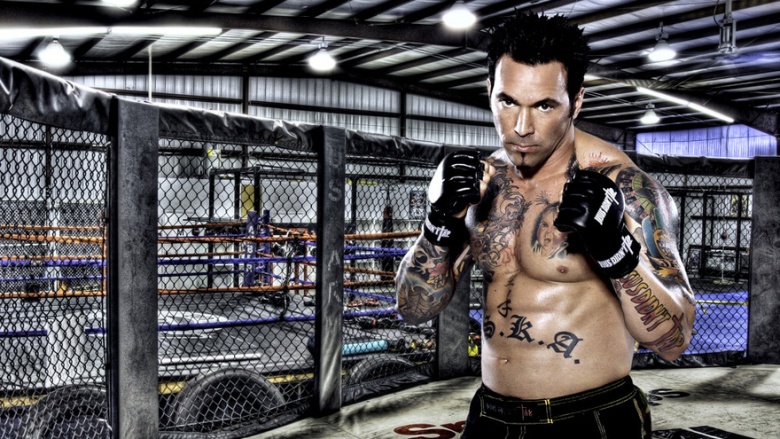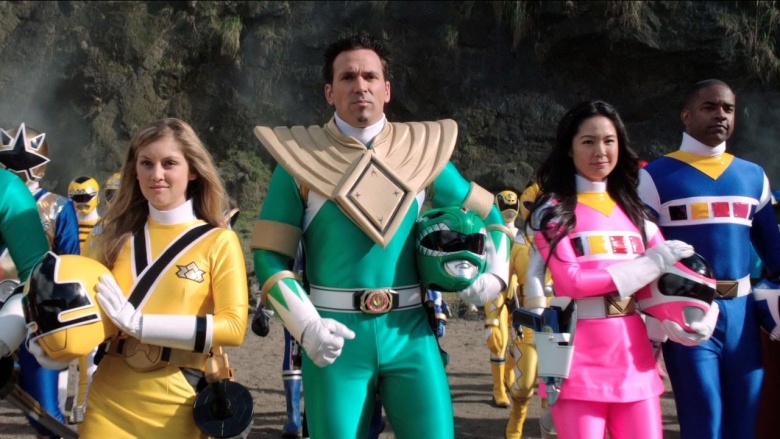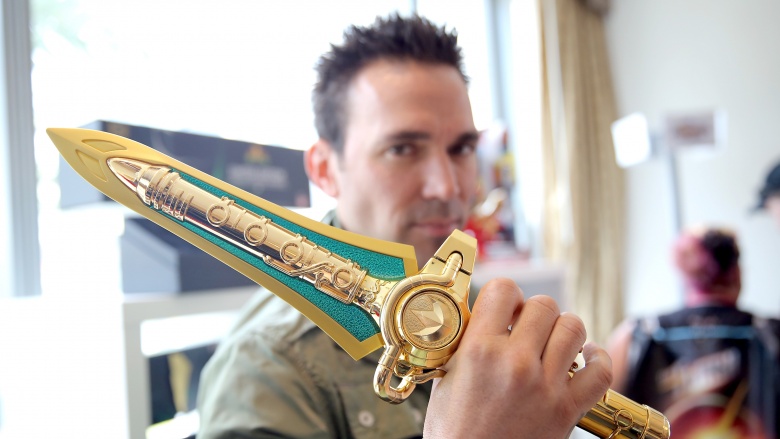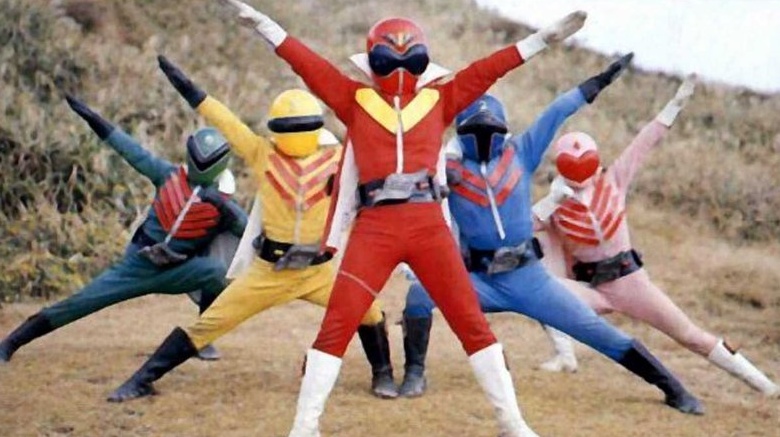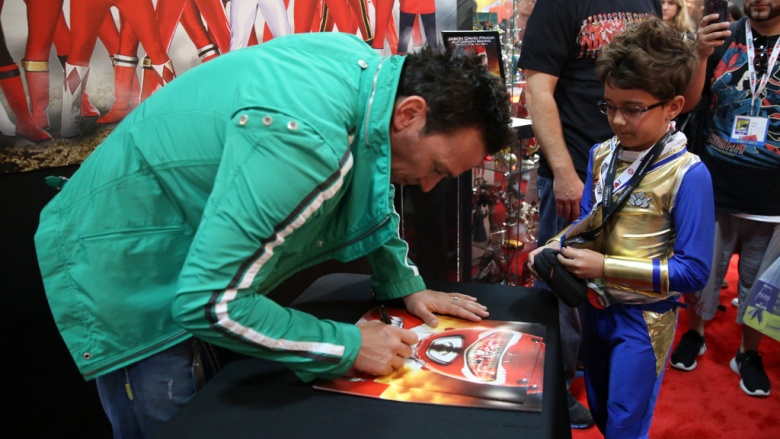The Untold Truth Of Being A Power Ranger
If you're in your twenties, you remember Power Rangers. That show was your childhood. But you might not realize how much went on behind the scenes, especially if you were too young at the time to think anything other than "Whoa! This is cool!" We interviewed Jason David Frank, the original actor for the Green and White Rangers, to get the full scoop.
You're a real martial artist, but no one believes you
"I'm a karate master," Frank points out. "I've been doing it since I was four, and I'm a ninth-degree black belt and I own my own school. But people will still come up to me and ask 'Where'd you learn your karate? On the show?'" Frank just smiles every time he hears that one. The actors did a lot of the fighting on the show; Frank did flips, handsprings, kicks, tree flips, and more. It's why he got the role. Up until then, the studio had only ever seen "Hollywood" martial arts, so when Frank walked in, they didn't know what to do with him. They were all blown away.
When Frank enters the MMA ring to fight someone, they sometimes think "Oh, it's just the Power Rangers guy. He's not a real fighter"—an assumption that puts their guard down and works to Frank's advantage. They don't expect him to have anywhere near his level of training or expertise. (By the way, he's undefeated right now.) "I just let them think whatever they want," Frank adds. "I learned this in episode 53. Check out what I did to the Monster Mash monster. And I'm not the only one—the Red Ranger is a black belt in brazilian jiu jitsu. He's a hell of a fighter. But it took us forever to rebuild our reputations as 'real' martial artists after being on the show."
It doesn't matter if you win or lose
It never mattered to Frank whether he won or lost his MMA matches. "It's funny," he jokes. "If you lose, it's 'Ha ha. You got beat up by the green Power Ranger.' But if you win? 'Man, you beat the Green Ranger. You shouldn't have done that—now all my fans are angry at you.'"
No publicity is bad publicity, so as long as Frank steps in the ring, there's really no way for him to lose. That's why it surprised him so much when people refuse to fight him—like Jean-Claude Van Damme, who challenged Frank only to back out.. "When I accepted, he backed down and wouldn't fight me," Frank explains. " It happens a lot. The Red Ranger's actor talked all the time about how he could beat me in a fight, but never fought me when I accepted his challenge. I don't get it. Like I said, win or lose, I don't lose. And neither do they, really. Why would you not come together for the fans and do something cool like that?"
Holding up Power Ranger ideals can cost you your job
The filmmaking industry has a funny way of going to your head. Think about it: You're a star on a popular show. People are waiting on you hand and foot, combing your hair, getting your wardrobe for you. People from the studio are telling you not to talk to certain members of the crew, truck drivers, or whoever. It's not hard to develop a sense of superiority if you're living in that kind of bubble. Frank's dad was a truck driver, so he went out of his way to make sure the Power Rangers crew felt important too.
"I left the show because of my ideals," he says. "The other actors never saw the owner. I did. He tried to wine and dine me, but I remained who I was." One day, enough was enough, and Frank told him that he needed to communicate with the other actors and not just throw money at them. His response was essentially "I don't need to see anyone. Money talks. Have some more and be quiet," so Frank left the show.
Frank had some harsh words about the situation, but it's kind of inspiring to realize that there are actually decent people out there. "He picked the one guy that wasn't in it for the money," he adds. "I'm not a hooker or prostitute. You can't buy me out." So much revolves around money—it's refreshing to see that it doesn't mean everything to everyone. And that some of our childhood heroes really are heroes.
Some characters are real people
Frank had the ability to create any character he wanted to for the show, and it's incredibly important to him that people understand the story behind the scenes. "Tommy was me," he explains. "He was a G-rated version of me, but it's still who I was. I was a real loner, and that's the role that Tommy first filled on the show. I was always the kid that was off on his own, wearing X-Men t-shirts and getting teased a bit. ... as the role changed, it helped me grow into other parts of myself."
It was spliced footage
Power Rangers was based on the Super Sentai series from Japan—a superhero show similar to Power Rangers, but with heavy Japanese overtones. Seriously, think "stereotypical Japanese thing with superheroes fighting robots," and you won't be too far from the mark. Regardless, Saban took this crazy popular Japanese show and bought the footage, which comes as a bit of a disappointment to fans who thought the American actors filmed all their own stunts.
For a time, Frank filmed his own stunts; he didn't want someone else to do it. But once the show got more popular, Saban worried more about liabilities, so the actors got to do less and less of their own stunts. It got to the point where almost all of the costumed scenes were either from the Japanese show or filmed by stuntmen and voiced over. In the later days, the actors mostly did the out-of-costume scenes. Frank always insisted on doing the actual martial arts himself, but doing flips out of trees? Too much of a risk for the studio's comfort.
"I think a lot of fans realize now that the show was spliced together," says Frank. "But back when it was on, a lot of people thought we really shot all of it, and we didn't. But some people were disappointed and still feel that way."
You're never NOT a Power Ranger
The young viewers in the show's target demographic sometimes believed the Power Rangers were real—an impression deepened by the fact that the cast would even do interviews in character. At one event, a young attendee asked Frank why the Power Rangers didn't stop the Oklahoma bombing, and that's always stuck with him. He went to Saban and urged the company to film a public service announcement to let viewers know the show wasn't real. "That sounds terrible. The image of a superhero is real, don't get me wrong," he says. "But kids were getting horribly disappointed that they didn't see us out there fixing real problems. I heard that question about the Oklahoma bombing, and I wanted to be like 'Yeah! How come we weren't?”"
It's like finally learning that Santa isn't real, but when you're expecting him to save lives instead of bringing you a new bike, it's infinitely more heartbreaking. Frank's been let down by heroes that weren't what he expected them to be, so he still maintains fitness goals and lives by Power Ranger ideals, so that kids who see him as a hero don't meet him and feel that same disappointment.
Frank even refuses to accept appearance fees at conventions or any public appearances. He doesn't tell people they can't take pictures or videos when they meet with him. He signs anything. He has fun with it, and he's passionate about it. Just one look at him interacting with his fans is proof.
It's all about the fans
Frank clearly loves everything about being a Power Ranger. After Disney bought out the franchise, the show's ratings were slipping, and the new producers (who Frank had worked with before) had the idea to bring back some of the old actors to boost ratings. According to Frank, this is when he realized that the Green Ranger and Tommy had become something bigger than himself. Money was tight as far as the studio's budget for the show was concerned, but he says he told them "I don't care, I'll do it for a dollar."
Frank has also been involved in some pretty interesting fan-made side projects, such as an internet video showing the White Ranger fighting Scorpion from Mortal Kombat, which you can watch above. It's one of the coolest things the internet has produced in awhile, and seeing the White Ranger obliterate Scorpion filled my heart with all the nostalgia.


